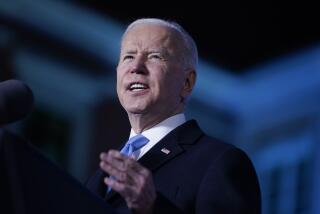Taxes made too simple
Although the lame-duck session may be too short for Congress to decide which, if any, of the Bush-era tax cuts to extend, the outlines of a potential deal are emerging: Instead of permanently extending all of the cuts (as Republicans want) or just the cuts for those with incomes of less than $250,000 (as Democrats prefer), Congress would temporarily extend the whole package. Lost in the deal-making, though, has been any discussion of the role that tax changes could play in boosting the economy.
Lawmakers have stuck to a simplistic narrative when talking about the Bush tax cuts. Both sides agree that the economy is too weak to allow all of the cuts to lapse. But Democrats balk at the price tag — it would cost almost $4 trillion over 10 years to extend the entire package. Instead, they want to let the tax cuts for the highest earners expire, saving $700 billion. Republicans argue that all of the cuts should be renewed, saying that increasing rates on the top two income brackets would discourage small businesses from hiring and slow the already sluggish recovery.
If the goal is to create jobs, however, maintaining a tax break for filers with incomes of more than $200,000 to $250,000 isn’t an effective way of doing it. That’s because there’s at best an indirect link between lower marginal rates and increased hiring by the employers who report business income on their personal tax forms. There are far more direct ways for Congress to attack unemployment. Given that Republicans aren’t troubled by the cost of the full package of tax cuts — all of it financed with borrowed dollars — they should have no problem rerouting billions in tax breaks for the wealthiest Americans to, say, a payroll tax holiday for new hires or faster write-offs for new business equipment.
It would have been nice to see that kind of compromise coming out of Tuesday’s meeting between President Obama and congressional leaders. But while some Democrats are on board, most seem more interested in forcing Republicans to cast a potentially embarrassing vote against renewing just a portion of the Bush cuts. One faction is pushing for a vote on renewing the cuts for those earning less than $250,000. Another wants to extend the cuts for anyone earning less than $1 million, which would cost $300 billion to $400 billion less than the GOP plan.
Ideally, lawmakers would have spent much of the last year considering how best to use the tax code to promote growth. Instead, they spent much of the last year campaigning. There’s so little time left before the tax cuts expire, Congress probably isn’t capable of moving beyond the all-or-nothing choice presented by the GOP. But with unemployment expected to remain high for the foreseeable future, it’s worth trying to develop a more effective, growth-oriented tax policy — if not now, then when the new Congress convenes next year.
More to Read
Get the L.A. Times Politics newsletter
Deeply reported insights into legislation, politics and policy from Sacramento, Washington and beyond. In your inbox three times per week.
You may occasionally receive promotional content from the Los Angeles Times.










